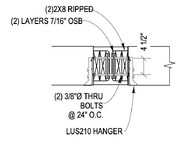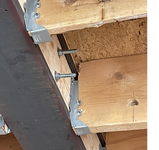Passing what? Would it hold the load for some arbitrary amount of time, yeah probably. Job done?
Exactly that. I would argue that the ASCE guidance on load testing also has a fair bit of "arbitrary" built into it.
Guides like that are put together mostly by committees of other engineer using
their judgments. Do those guys and gals have better judgment than I do? Surely. Does a committee formed consensus add weight to it? Absolutely. But it is still a far cry from anything resembling hard science.
One of the main reasons that practitioners lean on load testing guides is because they allow us to abrogate risk. If something goes wrong, you can just point to the document and claim to have been following orders. I'm not saying that's bad in any way. It's mostly good. But I do feel that acknowledging the truth of the situation with respect to the state of knowledge and our own motivations is germane to discussions like this.
Could there be issues that lead to a lesser than intended performance, excessive nail slip (for the lucky few that made it into the hanger) for instance?
Sure, I acknowledge that. If we're going to do a deeper dive on the philosophy of risk, then I'll add some meat to the bones of my previous comments:
1) Like most decisions that a human takes, this one is multi faceted with respect to risk, weighting factors, and probabilities.
2) A more nuanced version of my risk assessment here would be:
a) Collapse / guillotine. 1:50,000.
b) Serviceability issue that winds up negatively affecting my business. 1:500.
c) Developing a reputation for inflexibility that negatively affects my business. 1:50.
I don’t know how you could possibly be so confident in the long term performance, but it’s your head on the line so it’s yours to risk.
I had to train myself, painfully slowly and at great emotional cost, to approach engineering in this way. I came from the factory with a temperament not at all suited to making difficult, rational, risk based decisions involving public safety under conditions of great uncertainty. Truly, though, I consider this to be the single most valuable thing that I have ever learned as an engineer (or as a person really).
Early in my career, I was all about
"Do it as I specified it! The end. Why should I assume more risk because of your mistake?". I now feel that previous version of me was speaking mostly from a place of immaturity and fear with respect to both engineering and business.
I now consider one of my most important engineering duties to
serve as a risk sink for my clients.
Expanding upon that a bit, it's
using my well honed engineering judgement to take strategic risks that solve business problems for my clients.
I know, this will be anathema to how many folks participating in this thread feel. And it no doubt runs counter the letter of the law expressed in some of the board regulations. Regardless, this is how I feel that one ought to do the job of being a structural engineer.
Many people here, and in real life, prize me mostly for my technical skills. But, then, where am I able to use those skills to the meaningful benefit of anyone? Is it in laying out a bar joist roof at 6.5' o/c for the hundredth time? Or in berating some junior engineer in the finer points of stability. NOPE. The very best place for me to employ that technical skill is precisely in
issues like this. It facilitates my bending rather than breaking.






